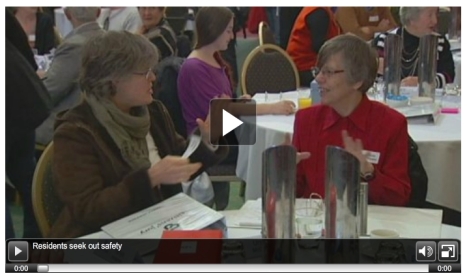Iain Walker of newDemocracy collected some TV reports about the citizens jury on alcohol related violence in South Australia:
Channel 9:
Filed under: Applications, Juries, Press, Sortition |

Iain Walker of newDemocracy collected some TV reports about the citizens jury on alcohol related violence in South Australia:
Channel 9:
Filed under: Applications, Juries, Press, Sortition |
This site uses Akismet to reduce spam. Learn how your comment data is processed.
Blog at WordPress.com. WP Designer.




As I wrote in my blog, the presentation of the CJ to the public by Channel 9 is appalling. The public broadcaster ABC does a much more positive and informative job.
LikeLike
I don’t really agree. I think the channel 9 presentation is generally balanced. I think skepticism is justified about the entire process, and in particular about paying large sums of money to consultants.
LikeLike
Interesting. I wonder, though, if Citizen Jury is the right term for a body whose remit appears to be primarily policy innovation. I think this would be better served by Terry’s term Policy Panel (the first stage in his hierarchy of allotted bodies). This would be, broadly speaking, parallel to other forms of open public initiative, final adjudication by a representative body (either elective or descriptively-representative) coming at a later stage. The advantage that it has over public petitions that require a minimum number of support signatures would be that the filter is deliberative, rather than numerical, but there would still be a need for subsequent democratic filters as a small number of citizens selected from a volunteer pool would not pass the test of statistical representativity (stratified sampling would not overcome the initial self-selection bias). This would particularly be true if (as Channel 9 claim) policy innovation is influenced by paid consultants and other lobbyists.
LikeLike
Interesting. Does anyone know what is the process whereby the random sample was winnowed down? I wasn’t clear on that.
FWIW, I thought the description of the group’s mission was a bit misleading. It didn’t sound like the group was charged with coming up with its own ideas. There were already a bunch of ideas in front of it–rather, the group was charged with examining them and selecting among them. Maybe it was also supposed to “polish’ some of the ideas as well. But that’s much different from devising new policies from scratch.
Finally, I must say I found myself agreeing with the opposition leader a bit. I’m unclear on just why a randomly-selected body is supposed to be appropriate for this particular task. Again, if the legislature simply wants proposals from the general public, why not ask for them directly? What does the random selection contribute? It’s unclear to me.
LikeLike
Peter,
What does “ask for them [proposals] directly” mean? Allowing the public to write letters with proposals to the legislature? That option is always available.
I think the desired effect of sampling (at least the effect I would desire) is clear: concentration of resources and authority can be expected to lead to more representative proposals than the mass politics of letter-writing or of opinion polling.
LikeLike
YG>concentration of resources and authority can be expected to lead to more representative proposals than the mass politics of letter-writing or of opinion polling.
That’s a counter-intuitive suggestion, please explain (in particular the benefits, to representation, of concentrating authority). The only merit of statistical polling is that it is descriptively representative, the problem is that the opinions sampled are poorly-informed. One can imagine a public opinion survey in which respondents are asked to decide between an infinitely large number of policy proposals — the results of this poll would accurately represent the ignorance of the population of the merits of the proposals. So the variable is not representativity, it’s information. I do accept though, that letter-writing will only represent the tiny subset of the population who like to write letters on political projects.
I do hope you respond to this, because I suspect that you are using the word “representation” differently to the way it is normally understood.
LikeLike
We’ve been over this many times. See here, for example.
LikeLike
Yoram, the main reason for engaging in this sort of conversation is the belief that people’s views will change over time as a result (hopefully) of the exchange of reasons. If you constantly refer back to earlier exchanges then there will be no progress. I would like to think that my views have evolved over time and that this is, to a great part, a result of the exchanges on this forum. How about you? If you’re entirely happy with your earlier comments then by all means use cut and paste.
LikeLike